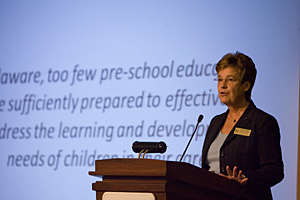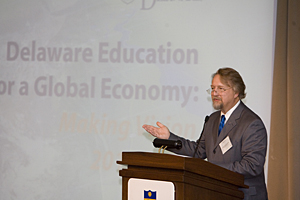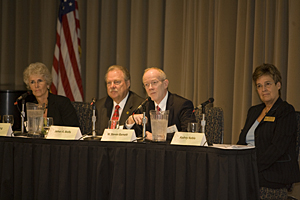

- Click here to view slideshow.
- 3rd Partnership Conference focuses on education for a global economy
- British expert urges U.S. to push ahead with education reforms
- Early childhood education declared an essential foundation
- Keeping stride globally should be goal No. 1, Vision 2015 panelists say
- Schoenhals calls for major reforms in public education
Click here to see Audrey Noble's presentation on "Transforming Early Childhood Education in Delaware."
Click here to view or download a video of this conference session.
4:51 p.m., Oct. 3, 2008----Few investments these days have the high rate of return of investments in early childhood education, according to panelists at a conference “Delaware Education for a Global Economy: Making Vision 2015 Work,” held Oct. 2 at UD. Moderated by Michael Gamel-McCormick, interim dean of the College of Human Services, Education and Public Policy (CHEP), the panel examined the necessary steps needed to provide quality early education for every child in Delaware.
Access to such education is one of six major recommendations outlined in Delaware's Vision 2015 plan, created by a coalition of academic, government and business leaders to transform public schools in Delaware into the best in the world by the year 2015. As one panelist noted, “If left unaddressed, this situation [deficiencies in early education] will continue to undermine all of our other efforts.”
“Early education is one of the best investments we can make,” said Audrey Noble, professor of education and director of the University of Delaware Education Research and Development Center. “Each dollar spent on early education saves society about $4 to $7 down the road in other costs, such as incarceration and Medicaid.”
She cited research showing that quality early childhood education contributes to a child's readiness for school as well as to the state's economic development, that it minimizes future social problems related to health and the need for special services, and that quality teaching contributes more to children's success than any other factor in school.
The biggest challenge, according to Noble, is that preschool teachers are often inadequately prepared and underpaid. High expectations of performance coupled with low compensation make recruiting qualified teachers difficult, she said.
“One study in Delaware found that 93 percent of infant and toddler teachers and 58 percent of teachers of children ages 3 to 5 have only a high school education. Some lack literacy skills beyond a sixth grade level,” Noble said.
Moreover, administrators and teachers in Delaware's preschools generally earn less than half of what their counterparts in a K-12 setting earn. In 2007, the average wage among Delaware preschool teachers was $24,650 per year, “just above the poverty level of $21,200 for a family of four set by the U.S. Department of Health and Human Services,” she said, noting that the wage figure does not include aides and other helpers often present in the preschool classroom, who usually earn even less.
Panelist Steven Barnett, director of the National Institute for Early Education Research at Rutgers University, reinforced Noble's point that both better training and better compensation of early educators are needed, saying “neither alone is sufficient.” According to Barnett, only 20 states currently require a bachelor's degree for pre-K teachers.
“When you get right down to it,” he said, “they just have to be older than the kids they serve, have a criminal background check and have some experience with kids other than their younger brother or sister.”
Barnett shared a video depicting characteristics of an effective preschool classroom based on current research about how young children learn best. He noted that preschool teachers must be skilled in facilitating children's emotional and social development, as well as their cognitive development.
“A good teacher understands where every child in the classroom is in terms of all these domains,” he said. “He needs to learn to get along better. She needs to work on reading skills. It's a very complicated job.”
Barnett also emphasized the return on investment theme in his remarks, noting that some analyses showing the benefits of early childhood education have followed children who participated in trial programs in the 1960s. “These children are now in their 40s,” he said. “The results are clear. It's not speculation or extrapolation.”
Susan Bunting, superintendent of the Indian River School District and an alumna of the Educational Leadership Program in UD's School of Education, spoke about her district's successful preschool efforts. One model program, Project VILLAGE (Verbally Intensive Language and Literacy Activities for Growth and Education) was launched to serve the district's growing Spanish-speaking population. The initial students in the program, she noted, are now in high school and continue to meet or exceed state standards.
The final panelist, James A. Wolfe, president of the Delaware State Chamber of Commerce, offered the Delaware business community's perspective on early childhood education. Businesses looking at moving to Delaware see that the cost of doing business in Delaware is low, he said, but they also recognize a mediocre education system.
“Kids that lack early childhood education are often two to three years behind their peers when they enter kindergarten,” Wolfe said, “and many never catch up. They are not ready to step into the business world when they complete school.”
At the close of the panel discussion, Gamel-McCormick announced a new agreement between the University of Delaware and the Delaware Department of Education to launch the Delaware Institute for Excellence in Early Childhood.
“This institute will provide a comprehensive and coordinated approach to early childhood professional development in Delaware, will help to build a system of technical assistance to providers, provide the most recent literature and research related to early care and education and help to establish the highest quality early education possible,” Gamel-McCormick said. “The opportunity to create and operate an institute dedicated to excellence in early education has been a long-term dream for many in the field and will be one more brick in the path toward the highest possible quality of early care and education for Delaware's children and families.”
Beth Chajes
Photos by Kevin Quinlan



